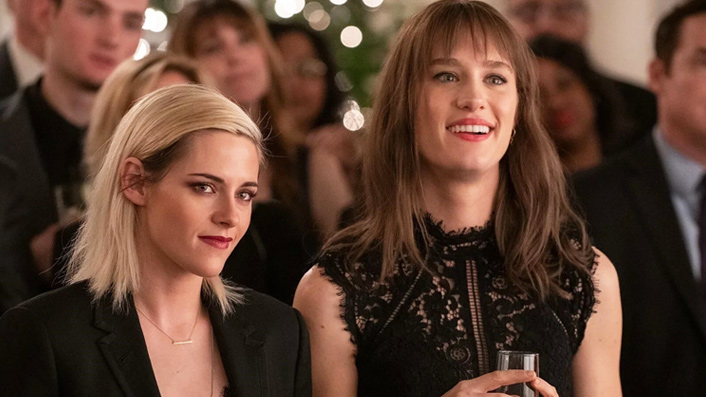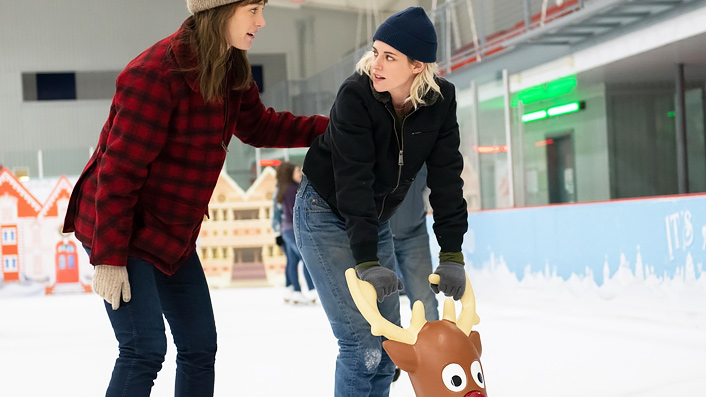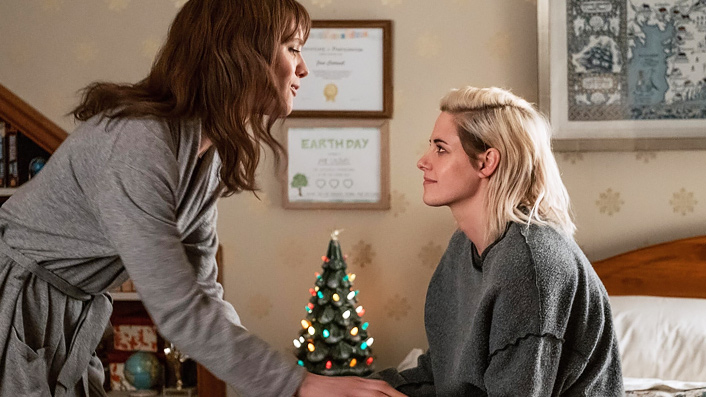Happiest Season adds a lesbian twist to a generic Christmas rom-com

Rom-com Happiest Season (now in cinemas) stars Kristen Stewart and Mackenzie Davis as romantic lovers. Many will be charmed, but the film fails to make a point about how society still forces people to hide their sexuality, writes critic Glenn Dunks.
There is a strange genre of American movies in which families get together around the holiday season and are extremely unpleasant to each other. Of course, there is almost always a newcomer, a new romantic partner or a friend of somebody in the family, who gets caught up in a whirlwind of white affluence. Inevitably they all prove they love each other by the end, and everybody lives happily ever after. Think of The Family Stone. It’s a curious cinematic phenomenon, and one that rears its head every year in that stretch from Thanksgiving to Christmas.
See also
* All new movies in cinemas
* All new streaming movies & series
Happiest Season is the new yuletide romantic comedy from director and co-writer Clea DuVall, and it is another unfortunate addition to this camp. It scores a few points for being the first mainstream rom-com with a lesbian romance at its centre, but it is also a film in which most of its characters are horrible, spiteful examples of class and privilege. And without the funny jokes (like in, say, The Ref) for it to be a gag at their expense.
Abby (Kristen Stewart) and Harper (Mackenzie Davis) are like any other classically mismatched rom-com couple. Abby doesn’t like Christmas, but Harper enjoys goofy excursions to look at Christmas light decorations across town. You know, opposites attract. However, we know they are in love because the dialogue tells us so. On a drunken whim, Harper invites Abby to her family’s Christmas, but gets immediate buyer’s remorse upon discovering she hasn’t come out to them. Hijinks and misunderstandings ensue including run-ins with Harper’s ex-boyfriend (Jake McDorman) and secret ex-girlfriend (Aubrey Plaza).

It’s supposed to be fluffy escapism
It’s all supposedly fluffy escapism, but the Caldwell clan aren’t easygoing people. Dad Ted (Victor Garber) is a politician of ambiguous affiliation (although it’s obvious he’s a Republican) running for office, while mum Tipper (Mary Steenburgen) turns passive aggression into a recreation and older sister Sloane (Alison Brie) has a nose so upturned I’m surprised she’s able to walk in a straight line. Little sister Jane (co-writer Mary Holland) is the runt of the litter: an eager-to-please oddity whose kind nature is constantly taken advantage of.
Happiest Season collapses upon meeting the family. With caricatures written in broad strokes by DuVall and Holland, they prefer flat slapstick and half-arsed, unfunny attempts at irreverent humour. The Caldwell clan inflict misery after misery on Stewart’s perfectly lovely Abby. Aside from a misjudged subplot involving jewellery theft, the family members’ strange obsession with reminding Abby of her deceased parents is maybe the script’s most bizarre recurring gag. In many ways it wishes it were Schitt’s Creek—highlighted by the casting of Dan Levy as Abby’s friend and fake ex-boyfriend for appearances.
It’s a shame, because the film misses what could have been an interesting dramatic narrative about how society still forces many to hide their sexuality and push themselves back into the closet for the sake of heteronormative family harmony. But instead of pursuing these themes with anything resembling real human emotions, even with a comic bent, Duvall prefers pratfalls. And an unfunny ones at that.
It shows the benefits of queer creators telling queer stories
A worse movie would have paired Stewart and Plaza romantically to up the stakes, but here is where the benefits of queer creators making queer narratives comes into play. Their scenes of burgeoning queer friendship hum with a poignancy that is otherwise all too rare in Happiest Season. Similarly, Stewart’s big emotional moment with Levy cuts to the bone of why it is still important to show support and kindness to those who struggle to come out, even in this time of marriage equality and social progressiveness. Knowing out performers like Stewart and Levy are playing true to themselves is refreshing and something we should see more.
Since she’s so intent on making a goofy comedy, one wishes DuVall’s unimaginative direction had taken influence from the movie that introduced her to many queer audiences: But I’m a Cheerleader. That film mocked heterosexual norms with a wash of hot pink camp.Here, however, her prime inspirations appear to be Hallmark and Nancy Meyers. Which isn’t to say that LGBTIQ audiences don’t deserve their own chance to see a gay romantic comedy in all its glossy glory. But Happiest Season is so extricated from anything approaching reality, with characters not written well enough to root for, that it just does not work.

Its halls are decked with clichés and tropes
This is DuVall’s second film as director following another ensemble film, The Intervention. That one didn’t entirely work either, but it at least found tension in the way it navigated friendships on the brink. There is no such inclination to dig into these characters. They’re all just fodder for unearned third act redemption arcs designed to make you forget that they were all rotten people for 80 minutes.
I have no doubt that many will be charmed by its generic nature. DuVall has certainly been smart to populate her film with enough popular actors and meme-able gif-ready moments to give the illusion of a film that won’t evaporate from memory within moments of the credits rolling. But its halls are decked with clichés and tropes, which it has no desire to comment on or subvert in any way beyond the lesbian twist to the formula. It’s a lump of coal wrapped in a rainbow flag.

















